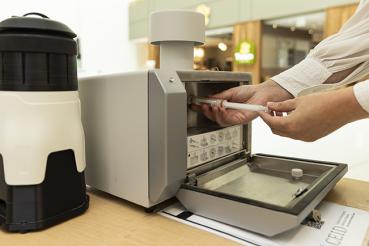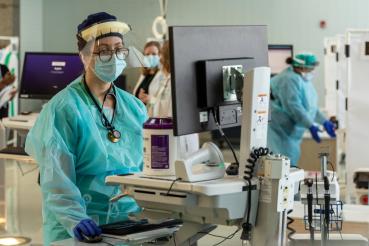If you’re confused about COVID-19 testing, you’re not alone. Talking to your friends or browsing social media, it seems everyone has questions about whether they should get tested in certain situations, such as before taking a trip, before visiting a high-risk loved one or after possible COVD-19 exposure.
Part of the problem is that there’s been mixed messaging about who should get tested, and when. Some people claim to have had false negatives and question whether the tests themselves are accurate. Plus, with test shortages, relatively few testing facilities and lengthy lines at the test sites that are open, getting a COVID-19 test can be challenging.
We asked Rush infectious disease specialist Michael Lin, MD, MPH, to clarify when COVID-19 testing is, in fact, recommended — and to explain why testing, while important, is only part of what you should be doing to prevent the spread of the coronavirus.
When to get tested for COVID-19
You have had unprotected close contact (within 6 feet for a a cumulative total of at least 15 minutes over a 24-hour period) with a person in the community who has been diagnosed with COVID-19.
In late August 2020, the Centers for Disease Control changed its guidance on whether you should get tested after close contact with a person diagnosed with COVID-19. The CDC currently recommends against being tested if you aren’t experiencing any symptoms after that contact.
However, the Illinois Department of Public Health is still recommending that anyone who has had close contact be tested, even if you don’t experience symptoms.
“People with COVID-19 may not have any symptoms but are still capable of spreading the virus to others,” Lin says. “Also, if you are asked by a public health official to enter a 14-day quarantine because of exposure to COVID-19, it is important to note that a negative test does not get you out of quarantine.”
You have one or more of the following COVID-19 symptoms:
- Fever/chills
- Cough
- Shortness of breath
- Sore throat
- Body aches
- New loss of taste or smell
“Even if you have just one of these symptoms, and even if it’s mild, we recommend you get tested,” Lin says. “We’ve seen plenty of examples of people testing positive who had only one symptom, so it’s best to err on the side of caution. Earlier testing leads to better identification of the disease and better control — we can prevent other people from getting infected.”
What about headache and diarrhea, which have also been linked to COVID-19?
“It’s a judgment call,” Lin says. “There are just a lot of potential causes of headaches and diarrhea other than COVID-19, so we don’t include them in the list of symptoms we screen for at Rush.”
If these issues persist after you’ve tried over-the-counter remedies, however, Lin recommends talking to your primary care doctor or scheduling an on-demand video visit with a Rush provider. They can evaluate your symptoms and determine the best next steps, including whether to order a COVID-19 test for you.
Hospitals will test you for COVID-19, whether or not you have symptoms, in the following instances:
- You are a pregnant woman being admitted to the labor & delivery unit to give birth
- You are a having a transplant or chemotherapy
- You are having a procedure that involves anesthesia, or any aerosol-generating procedure of the airway or upper digestive tract (e.g., endoscopy)
The hospital may also test you if you are in a high-risk population, including being homeless, or living in a shelter, nursing home, skilled care facility or prison.
A negative test on any given day does not rule out a positive test on a subsequent day. It just says you are negative at that specific point in time.
When you should not get tested for COVID-19
You are asymptomatic but want to undergo periodic “surveillance” because of ongoing risks, like in the workplace, or because you want to create a “pod”
With the exception of health care workers, who may undergo asymptomatic surveillance testing, Rush discourages people from getting tested for surveillance purposes. Why? “A negative test on any given day does not rule out a positive test on a subsequent day,” Lin explains. “It just says you are negative at that specific point in time.”
The fear is that people who test negative will let down their guard and think they no longer have to take any precautions, which can lead to behaviors that endanger both them and others. “You might think, ‘I’m fine. I can do whatever I want.’ And you may then get infected and possibly pass the virus along,” Lin says.
That’s also why, even if you do test negative, you should continue to wear a mask whenever you’re in public, and practice social distancing and good hand hygiene. Or, as Lin puts it: “Just behave as if you didn’t get that negative result.”
The other problem with repeat testing is that there are still shortages of testing supplies. “If new tests are developed that can be implemented on a grander scale, and we can start to do more frequent testing for a much larger number of people,” Lin says, “there may then be a benefit to repeat testing.”
What if you want to create a “pod”— a small group of people who agree to have contact only with others in the pod? Isn’t it a good idea if everyone in the pod gets tested first?
Despite good intentions, it’s hard to guarantee that everyone will be able to comply with the “no outside contact” rule. So Lin says it’s best to simply continue to follow the recommended precautions within your pod.
Are COVID-19 tests accurate?
According to Lin, if a PCR (molecular) test comes back positive, it’s almost always correct.
PCR tests, the most commonly used COVID-19 tests, detect the virus’ genetic material. “These tests are FDA approved to be accurate. While no single test is perfect, the false positive rate is extremely low.”
Is the same true of negative results?
“In asymptomatic patients, the tests are highly accurate; that is, a negative test result is very likely correct,” Lin says. “You can feel confident that if you go into the test with a low chance of testing positive — no symptoms and no prior close contact — and the test says you’re negative, you’re OK.”
Far less common than PCR tests, antigen tests detect specific proteins on the virus' surface. According to Lin, the accuracy of antigen tests is unknown at this time. So if you test negative with an antigen test, you'll need to confirm the result with a molecular (PCR) test.
People experiencing COVID-19 symptoms do occasionally test negative. Doctors may order repeat testing if they strongly suspect a person has COVID-19 and there’s no alternative diagnosis, or if the symptoms continue to get worse — especially the ability to breathe.
As mentioned earlier, if you’re concerned about COVID-19 symptoms, talk to a provider as soon as possible, on the phone or via a video visit.
And, most important, regardless of test results, if you’re sick, stay away from other people. “It doesn’t matter if you have COVID-19, the flu or something else,” Lin says. “The point is that you have something, and you don’t want to give that something to anyone else.”
Learn more about COVID-19 test results.
Should I get a COVID-19 antibody test?
Antibody testing is not used to diagnose whether a person currently has COVID-19 infection. The test results may show whether a person has been infected with the virus, depending on the results. However, since no standard exists yet for determining accuracy, these results are not definitive.
If you have a COVID-like illness but a negative COVID-19 test, your provider may consider ordering an antibody test three to four weeks after you recover to determine whether you may have had COVID-19.
But according to Lin, “although there are several antibody tests out there, generally speaking, antibody testing isn’t useful because we don’t yet know what a positive test means in terms of protection against future COVID-19 infection.”
The good news is that COVID-19 infection does appear to confer some immunity — protection against reinfection. It’s unknown how long this immunity lasts, though data shows that it will likely last for at least 12 weeks.
Since there are still so many unknowns about what antibody test results mean and about immunity, even if you have a positive antibody test, Lin advises that you proceed with caution.
“You shouldn’t change how you’re protecting yourself,” he says. “We still don’t have a proven COVID-19 vaccine or cure, and the disease continues to spread at a very high rate. Follow public health guidance: Wash your hands frequently, wear your mask and practice social distancing. That’s the best way to keep ourselves and each other safe.”





